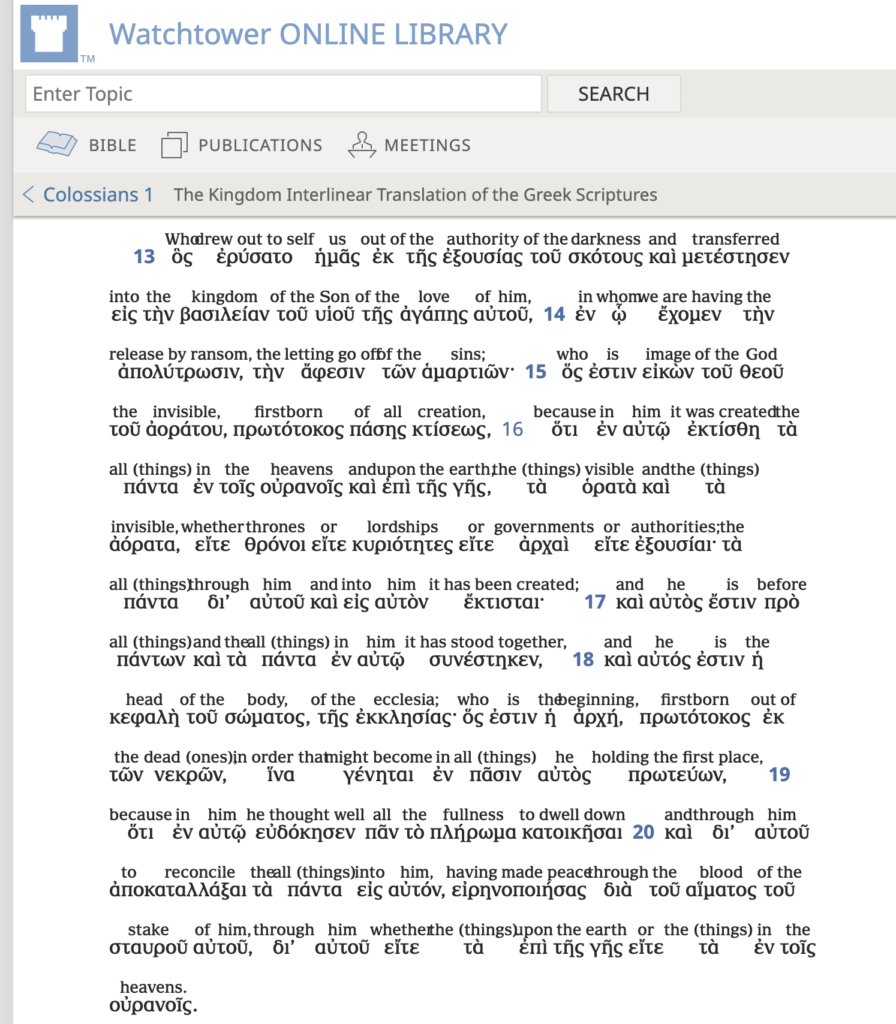Category: Catholicism
Deuterocanonical Books by Church Father
There’s a post written by Joe Heschmeyer which neatly lays out which Church Fathers used the which Deuterocanonical books. The problem is, I keep forgetting where it is on his blog, so I’m linking to it here, and copying over the key collection of data:
| Es. | Tob. | Jud. | Lam. | Bar. | Wis. | Sir. | 1 Mac | 2 Mac | Esdras (Gk) | Ps 151 | |
|---|---|---|---|---|---|---|---|---|---|---|---|
| Amphilochius | N | N | N | ? | ? | N | N | N | N | N | N |
| Athanasius | N | N | N | Y | Y | N | N | N | N | N | N |
| Augustine * | Y | Y | Y | Y | Y | Y | Y | Y | Y | N | N |
| Carthage | Y | Y | Y | Y | Y | Y | Y | Y | Y | N | N |
| Cyril | Y | N | N | Y | Y | N | N | N | N | N | N |
| Jerome * | Y | Y | Y | Y | Y | Y | Y | Y | Y | N | N |
| John Dama. | Y | N | N | ? | ? | ? | ? | N | N | ? | ? |
| Laodicea | Y | N | N | Y | Y | N | N | N | N | N | N |
| Melito | N | N | N | ? | ? | N | N | N | N | Y | Y |
| Origen * | Y | N | N | Y | Y | N | N | ? | ? | N | N |
| Rufinus | Y | N | N | ? | ? | N | N | N | N | N | N |
| Synopsis | N | N | N | ? | ? | N | N | N | N | Y | Y |
| – | – | – | – | – | – | – | – | – | – | – | – |
| Catholic | Y | Y | Y | Y | Y | Y | Y | Y | Y | N | N |
| Protestant | Y | N | N | Y | N | N | N | N | N | N | N |
* Denotes that the Father described widespread use of the Deuterocanon in Church.
Fr. Pavone
Yesterday I saw the unfortunate news that Fr. Frank Pavone had been laicized. I’ve already seen some Catholics on Social Media immediately posting “I stand with Fr. Pavone”. Their loyalty to Frank Pavone is touching, but the sentiment of such posts is unclear. I can see three possible interpretations:
- They believe the reasons for his dismissal to be false
- They believe the reasons for his dismissal are true, but they think the penalty is excessive
- They believe the reasons for his dismissal may or may not be true, but they just don’t care
Unfortunately, I have a suspicion that most people fall in the last camp…
Earlier echos…
When Fr. Altman was in the news about a year ago, we saw lots of people posting similar sentiments because they saw him as bastion against “liberal” Catholicism. Unfortunately few of his supporters would acknowledge the authority of his bishop or try to address his words and actions. In their minds, the very fact that he stood up for “conservative” Catholicism gave him a free pass. However, just because someone does great good, doesn’t make it impossible for that same person to have done something incorrect or wrong.
We’ve seen a very similar phenomenon in recent years among some Trump supporters. While some Christians who voted for President Trump acknowledge that they didn’t like some of the things he has said and done, others don’t seem to give such behaviour a second thought as long as he continues to “own the Libs”.
Balanced criticism
Now, one might ask why it seems that “conservative” priests appear much more likely to be disciplined than “liberal” ones. It’s a good question and I agree that discipline does seem to slant in one particular direction. However, that doesn’t mean we can just ignore ecclesiastical law, and just because one bishop fails in his duty to correctly discipline his priests doesn’t mean that all bishops must cease to do so.
Required Watching
I would invite anyone vocally asserting Frank Provone’s innocence or complaining about the unjust nature of his punishment to first reading this Catholic World Report article which outlines the main facts, as well as this one from The Pillar.
Next, I suggest watching this video by a priest who previously worked with him:
I would also invite you to read the article referenced in the above video:
Here is one of the tweets which seems to have got him into trouble:

Since disobedience was was of the charges against him, it’s probably worth noting that the video below was posted the day after he claims to have first discovered the ruling from the Catholic News Agency. I hope that the video was recorded prior to confirmation of his laicization, otherwise it doesn’t bode well regarding his future obedience to this ecclesiastical ruling:

Finally, as always, watch this video from Michael Lofton where he offers some level-headed commentary on the situation:
…and I would strongly recommend reading the article referenced which on How St. Padre Pio responded when the Vatican silenced him.
Qu’ranic Claims about Christianity
This is a placeholder as I collect together the various claims about Jesus and Christianity in the Qur’an:
Surah 4: Jesus wasn’t killed
Surah 5: The Trinity
Surah 5: Mary worshipped
Surah 9: Pay the protection money
Surah 19: Aaron and Mary were siblings and Surah 21: Mary is daughter of Amran, father of Aaaron
Surah 19: Jesus was born under a palm tree and speaks (Gospel of Pseudo Matthew and Gospel of Thomas)
Surah 19: Jesus speaks from the crib (Gospel of Thomas)
Surah 21: Abraham destroys idols and is thrown into a fire (Genesis Rabbah)
Surah 34: Solomon could fly on a carpet (Explained in Tafsir by Ibn Kathir)
This one isn’t quite a claim about Christianity, but the Christian source can be seen:
Surah 18: Retells a variant of the story told by Gregory of Tours
Hadith
As I’ve been watching debates recently I’ve heard some pretty wild hadith…
- The appearance of a child is dependent upon which of the child’s parents climaxed first (Sunan an-Nasa’i 200)
- Kissing the black stone for no reason other than seeing Muhammad do it (Sahih al-Bukhari 1597)
- Qu’ranic disputes (Sahih al-Bukhari 4987)
- A stone runs away with Moses’ clothes (Sahih Muslim 339)
- The deficiency of the female mind (Sahih al-Bukhari 2658)
- The plan for Jews and Christians (Musnad Ahmad 215)
- Solomon punished for not saying “Allah willing” (Sahih al-Bukhari 6639)
- Endorsed prostitution (Sahih al-Bukhari 5075) and (Sahih al-Bukhari 4615) and (Sahih Muslim 1406k)
- Sunan Ibn Majah 196: Allah can create something which can veil His glory. Why then can Jesus not do the same thing at His incarnation?
- Sunan Abi Dawud 4449: The Torah of the time is affirmed
- Sahih al-Bukhari 4862: Alludes to the Satanic Verses
- Sahih al-Bukhari 3032: Orders execution
- Sahih Muslim 1745a: Killing women and children
- Sunan Abi Dawud 4717: A girl murdered by her mother will go to Hell
- Sahih Muslim 2603: Muhammad says he’s fallible
- Sunan an-Nasa’i 4184: Muhammad selling two black slaves
- Sahih al-Bukhari 2229: The price of and coitus interruptus with female slaves
- Sahih Muslim 2767d: Sins of Muslims transferred to Jews and Christians on the Day of Judgement
- Sahih al-Bukhari 3320: Dipping flies into drinks, believing that they have cures in their wings
- Sahih al-Bukhari 3017: Muhammad orders the killing of apostates
- Sahih Muslim 1452a: Verses lost from the Qur’an
- Sahih Muslim 2662c: Allah makes some babies for Hell
- Sahih al-Bukhari 693: Muhammad’s racial slur
- Sahih al-Bukhari 7040: Black woman symbolic of plague
- Sahih al-Bukhari 7263: Muhammad has a black slave
- Sunan an-Nasa’i 3827: Muhammad has a black slave
- Sahih al-Bukhari 3392: Plural Gospels
- Mishkat al-Masabih 315: The eyes are the leather strap of the what?!
- Sahih al-Bukhari 402: Umar precedes Allah’s revelation perfectly?
- Sunan Abi Dawud 4717: Hell for both the child-killer and the child?
- Sahih Muslim 2662b: Babies fated for Hell?
- Sahih al-Bukhari 3244: Paul is quoted!
- Sahih Muslim 1452b: Missing verses from the Qur’an
- Sahih al-Bukhari 6614: Adam could not have chosen otherwise
- Sahih al-bukhari 4492: Two men from the same tribe arguing over recitation
- Sahih al-Bukhari 5037: Muhammad forgetting parts of the Qur’an
- Jami` at-Tirmidhi 3192: The timing of a common prophetic miracle is called into question with Jami` at-Tirmidhi 3194
- Jami` at-Tirmidhi 2653: Speaks about Muslims losing knowledge, even though they continue to recite the Qur’an. Is this the sort of “corruption” Muhammad had in mind for the Jews and the Christians?
- Musnad Ahmad 832: Uncertainty over verses
- Jami` at-Tirmidhi 2653: You can have a scripture but still lose knowledge
- Sunan Ibn Majah 2272: Muhammad sold slaves to buy Safiyyah
- Sahih al-Bukhari 7289: Don’t ask questions!
- Sunan an-Nasa’i 327: Nothing can make water impure!
- Sahih Muslim 2953a: The last hour has not yet come
- Jami` at-Tirmidhi 2653: The Jews and the Christians still have their scripture, they just don’t make use of them
- Sahih al-Bukhari 4944: Disagreements over recitation of Q92.3
- Sahih Muslim 1452a: Passage lost
- Sahih Muslim 22: Muhammad’s mission statement
JW Interlinear!
I’ve just discovered that the Jehovah Witnesses have an interlinear Bible with curious admissions about some key passages…
John 1
It doesn’t try to say that Jesus was a god:

Colossians 1
It doesn’t try to suggest that Jesus created every other thing:

Named after demons?

I was on Facebook just now and saw the following claim:
“real names of the demonics are names in most of the characters. You may do your own research.”
Facebook User
I have a deep suspicion that this person’s “research” is just the parroting of what Fr. Ripperger, an otherwise generally reliable source, has said in his talks. Here’s the quotation from one talk I’ve heard:
“One exorcist told me he’s kind of done the footwork. Whether it’s true or not, I don’t know. He said 60% of the names in Harry Potter are actual names of demons that exorcists have booted out of people.”
Fr. Ripperger
So, there are quite a few problems here:
- He admits he himself is just repeating a claim he’s heard elsewhere from an unnamed source.
- He admits doesn’t know whether or not it’s true. Personally, I would say that therefore repeating such a claim with no knowledge of its veracity is irresponsible.
- The claim itself is demonstrably false, even after five minutes of research. Even at a quick glance at the Harry Potter character list, to say that 60% of them are demons is ludicrous as most of the names are fairly ordinary!
Of the more exotic names…
- I can see a few names after star constellations, such as Bellatrix.
- Some names which sound strange to our ears are also names from the Bible. For example, “Silvanus” was the name of one Paul’s companions.
- Rowling seems to have made use of the Dickensian trick of making up a name that applies to someone’s personality. A good example of this is Mundungus which is the same name for an odorous Spanish tobacco.
- Lastly, a handful names like Alecto come from Greek and Roman mythology. However, that doesn’t mean that J.K. Rowling is trying to trick people into worshipping Greek/Roman deities (how would that even work, anyway?). If you’re going to exclude Harry Potter on that charge, you’d also have to throw out Narnia since C.S. Lewis has these Pagan gods appear in Prince Caspian.

So, returning to the original claim… where exactly are these names of demons? Can someone actually point out which characters are named after demons and provide evidence that these names are demonic?